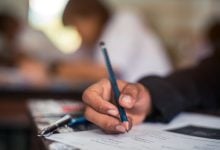Changes to maths curriculum come into effect
After a summer of preparation, schools are moving into the new maths curriculum for Years Zero to Eight from Term One this year.

From Term One this year, schools are required to use the refreshed Maths and Statistics learning area for Years Zero to Eight.
Schools are also required to ensure students receive five hours per week of teaching and learning in maths. It’s hoped that these changes will raise maths achievement.
In 2022, the National Monitoring Study of Student Achievement (NMSSA) found that less than half of students were meeting curriculum expectations at Year Eight. Testing has shown that under new standards, only 20 percent of students in their last year of primary school would meet expectations.
Read the latest print edition of School News online HERE.
On the ground, educators are worried students and teachers may become discouraged by the more difficult new curriculum.
“We do like the fact that the goal posts are very clear for us in terms of teaching. But for example, understanding of equivalent fractions at a Year 2 to 3 level, I think kids at that age are still really trying to get to grips with what a concept of a fraction is at that age,” said Plateau School principal Nigel Frater.
“There’s a bit of concern that those kids could get behind quite quickly.”
Frater said he didn’t want staff to rely too heavily on the new textbooks and resources.
“I’d be really concerned if schools started to lose sight of the curriculum and replaced it with the resource, and the resource became the curriculum,” Frater told RNZ.

Principal Hayley Read from Whangārei Intermediate said the resources they received were aimed at Year Seven to Eight students but didn’t consider those who were working beneath their expected level.
“The students that can’t access the curriculum because they’re six or seven years behind their chronological age in learning and expected to have the same book as a child who’s at that level, and so we don’t have those books and those resources to support those learners.”
Douglas Park School principal Gareth Sinton agreed it may take time to lift achievement for all students, especially those performing beneath expected levels, even with the old standards.
“But in saying that, it’s probably not a bad thing. I think there’s a body of evidence that our curriculum, the previous one, maybe wasn’t as rigorous as some other international comparable curriculums.”
Sinton agreed, however, that “the thought of having a Year Five kid working out of a Year Five book, it’s a load of nonsense,” as children at any year level will naturally vary in ability.
Douglas Park School would likely not use the workbooks provided, said Sinton, as the school used a group-based model to teach maths.
Julia Novak, General Manager of New Zealand Curriculum and Te Whāriki, Curriculum Centre at the Ministry of Education, said that the refreshed Maths and Statistics learning area has a clear teaching sequence, known as “structured maths”.
“The teaching sequence aims to build upon prior knowledge, introduce concepts at appropriate times and reinforce learning as students revisit and practice concepts and procedures. This change means that schools will not have to create teaching sequences themselves. It will support teachers’ planning and ensure a coherent progression of skills and concepts that students develop across their schooling pathway.”
Teachers can also find guidance on maths teaching on the curriculum website, which uses local and international evidence on best teaching practice to lift student achievement in maths and statistics. This includes best practice on building positive relationships with maths and statistics, ensuring ākonga develop confidence with maths and reduce their anxiety.
Teachers are encouraged to tailor curriculum content to the appropriate level for their learners using assessment information.









